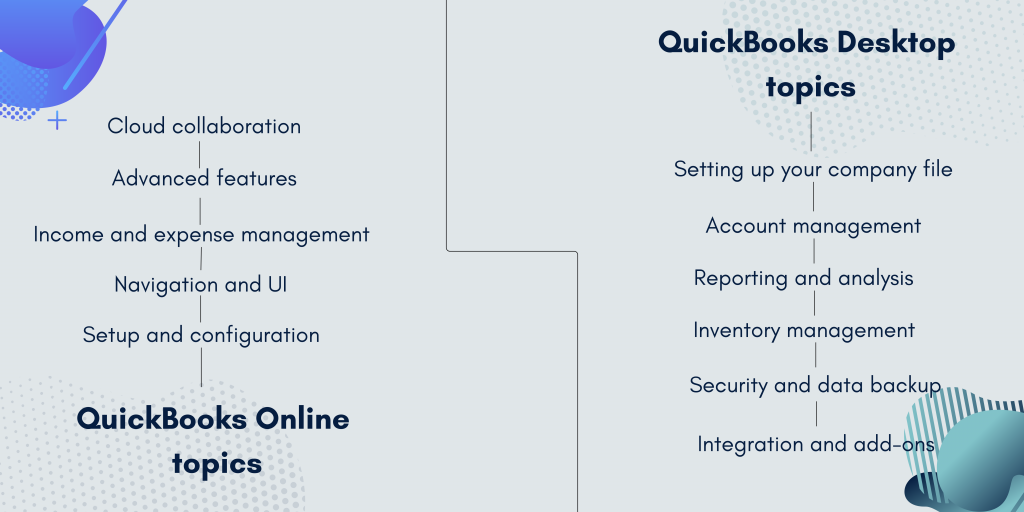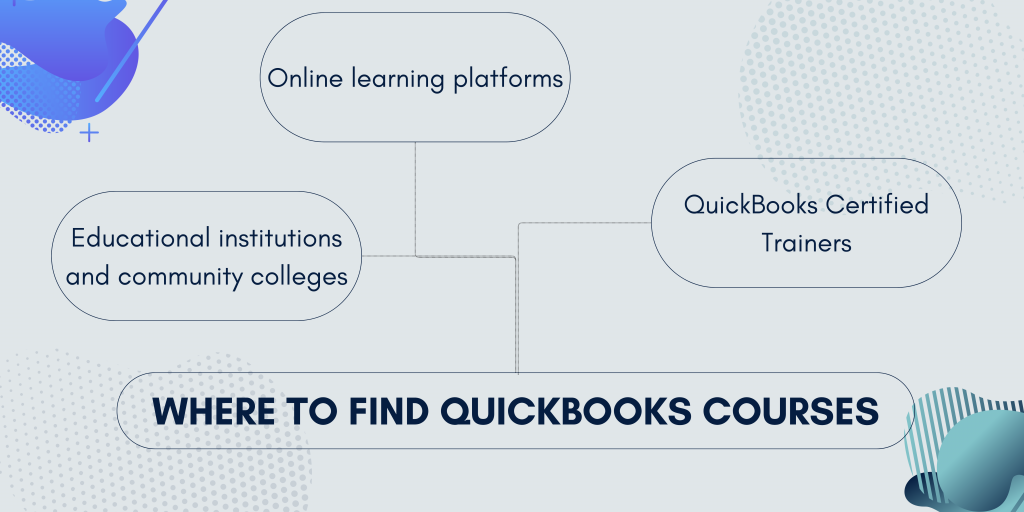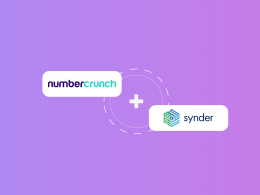Intuit QuickBooks is a widely adopted accounting solution, offering robust tools for financial transaction management, expense tracking, and report generation. While QuickBooks is a versatile platform that can significantly streamline financial processes, often, achieving mastery requires navigating a notable learning curve.
Today, we suggest looking at QuickBooks courses and certification, exploring how they can expedite your journey toward QuickBooks proficiency.
An overview of QuickBooks: biggest pros and cons
As mentioned, QuickBooks is a versatile accounting solution. It has long cemented its status as a go-to tool for businesses of all sizes.
Its robust functionality that allows for catering to most of the small to medium business needs makes it a favored choice. However, like any software, it comes with its advantages and limitations. Let’s explore the benefits and drawbacks of using QuickBooks.
The benefits of using QuickBooks
QuickBooks offers several compelling advantages that have significantly contributed to its widespread popularity.
Simplified accounting
QuickBooks is famous for its ability to simplify complex accounting tasks. This approach makes it accessible even to individuals without a deep accounting background. Small business owners and entrepreneurs find this feature invaluable as it enables them to manage their finances without extensive accounting knowledge. The software streamlines essential functions like income tracking, expense management, and invoice creation, thereby reducing the complexity of financial management.
Time efficiency
One of the most apparent advantages of QuickBooks is its ability to automate various accounting tasks. This automation significantly reduces the time spent on manual data entry and bank reconciliation and improves accuracy of the books. At this point it frees up precious hours for more strategic and revenue-generating activities.
Financial insights
QuickBooks provides real-time financial insights, allowing business owners to make informed decisions swiftly. With access to up-to-the-minute financial data, users can analyze their financial health and make necessary adjustments promptly. The software generates reports, visual data representations, and key financial metrics that offer invaluable insights into the business’s performance. This feature empowers users to spot trends, identify areas for improvement, and seize opportunities as they arise.
Customization
QuickBooks offers a high degree of customization, allowing users to tailor the software to their needs. It accommodates various industries and business types, enabling users to adapt the system to their unique accounting requirements. Users can customize invoice templates, the chart of accounts, and reporting formats. This flexibility ensures the software aligns perfectly with the business’s operations.
The drawbacks of QuickBooks
However, QuickBooks has limitations, and it’s essential to consider these potential drawbacks before adopting the software.
Learning curve
As with any software, there’s a learning curve associated with QuickBooks, particularly for new users. While QuickBooks features a user-friendly interface, it can take time to become fully proficient. Individuals with limited accounting experience may need extra effort in understanding the software’s functionality.
Cost
The cost of QuickBooks can vary significantly based on the version chosen and the business’s requirements for accounting. While there are affordable options, some of its more advanced versions can be expensive, especially for small businesses with tight budgets. So, buisnesses need to weigh the software’s features against its cost to ensure that it aligns with their resources and objectives.
Limited functionality
Advanced users or those with complex financial reporting needs may find QuickBooks limited in in-depth financial analysis and reporting. At this point, large enterprises with intricate accounting requirements might need more robust, enterprise-level solutions to meet their needs effectively. It’s crucial to assess whether QuickBooks can address your business’s specific requirements and financial goals.
Breaking down the learning curve of QuickBooks
As mentioned earlier, navigating QuickBooks’s extensive functionality can be daunting for newcomers. The vast array of features and tools available can initially overwhelm users, especially those without prior experience in accounting software. However, this learning curve is not a roadblock but an essential part of becoming a proficient QuickBooks user.
Understanding the need for learning
Understanding QuickBooks’ learning curve is crucial to appreciating the significance of investing time in gaining proficiency. QuickBooks is a comprehensive accounting solution. It caters to various business needs, from managing expenses and income to creating detailed financial reports.
To harness the QuickBooks full potential, users must become familiar with its interface, functionality, and best practices. It allows them to manage their financial data more efficiently, streamlining their accounting processes.
In other words, QuickBooks isn’t just about managing numbers. It empowers users to make informed financial decisions that drive business growth. By acquiring proficiency in QuickBooks, users can transform complex financial data into valuable insights and strategies. It’s this transformation that makes the learning curve not just worthwhile but essential.
The QuickBooks Certified User Exam
For those committed to mastering QuickBooks, the QuickBooks Certified User Exam is a pivotal milestone on their way to proficiency. This credential validates your expertise. It also provides several benefits that enhance your confidence and credibility as a QuickBooks user.
- Expertise validation
Passing the QuickBooks Certified User Exam demonstrates your mastery of QuickBooks. It proves you’ve acquired the skills and knowledge necessary to navigate the software. This validation is personally rewarding and professionally valuable, showing your competence to employers, clients, and peers. - Credibility enhancement
Earning QuickBooks certification elevates your credibility as a QuickBooks user. It reflects your dedication to honing your skills and staying up-to-date with the latest developments in the software. This credential can set you apart in a competitive job market. It can also establish you as a reliable financial consultant for businesses seeking expert guidance. - Confidence boost
Preparing for and passing the exam instills a sense of confidence and assurance in your ability to use QuickBooks effectively. This confidence can lead to more efficient and productive use of the software, further optimizing its benefits. - Professional opportunities
QuickBooks certification opens the door to various professional opportunities. It can enhance your career prospects, potentially leading to better positions and higher earning potential. If you are self-employed or provide financial consulting services, this certification can attract more customers seeking expertise in QuickBooks.
As you can see, the learning curve associated with QuickBooks is a natural part of mastering this powerful accounting software. Understanding its significance and investing time in gaining proficiency is essential for reaping the software’s full benefits. It can also enhance your professional credibility and open doors to a world of new opportunities in accounting and finance.
Types of QuickBooks courses
When starting your journey to mastering QuickBooks, you might want to explore the various types of available courses. As you might know, QuickBooks offers online and desktop versions. You can find courses designed for each and explaining how to work with the software step by step.

QuickBooks Online courses
QuickBooks Online is the web-based version of the software. It’s a typical choice for businesses that prioritize accessibility and collaboration. QuickBooks Online courses cater to the needs of users who prefer this cloud-based version. These courses might cover a broad spectrum of topics, providing a comprehensive understanding of the software and its capabilities.
Potential topics covered in QuickBooks Online courses
- Setup and configuration
QuickBooks Online courses begin with the fundamentals. Users might learn to set up accounts, choose the right plan, and customize their settings to suit their business. - Navigation and user interface
Understanding how to navigate the online version of QuickBooks is crucial. Users learn to move around the interface, access key features, and efficiently input and retrieve data. - Income and expense management
These courses teach users to record income, track expenses, and manage financial transactions efficiently. - Advanced features
QuickBooks Online offers advanced features, such as automated bank feeds and access from multiple devices. Courses might delve into these advanced features, ensuring users can leverage the full potential of QuickBooks Online. - Cloud collaboration
As cloud-based software, QuickBooks Online allows real-time collaboration between users and even accountants or bookkeepers. QuickBooks Online courses guide users on how to work collaboratively within the platform.
QuickBooks Desktop courses
Conversely, QuickBooks Desktop is the offline, locally installed software solution. It’s a usual choice for businesses prioritizing control and security over online accessibility. QuickBooks Desktop courses focus on this traditional version, covering various topics to help users maximize the software’s potential.
Potential topics covered in QuickBooks Desktop courses
- Setting up your company file
QuickBooks Desktop courses begin with the essential steps of creating and configuring your company file. It includes establishing your chart of accounts, adding products and services, and configuring tax settings. - Account management
Managing accounts is at the heart of any accounting software. These courses teach users how to efficiently handle accounts payable, accounts receivable, and general ledger entries. - Reporting and analysis
QuickBooks Desktop offers extensive reporting capabilities. Courses guide users in creating financial statements, analyzing financial data, and customizing reports to meet specific business needs. - Inventory management
Inventory-based businesses benefit from QuickBooks Desktop’s robust inventory management features. Courses cover inventory setup, tracking, and adjustments. - Security and data backup
Since QuickBooks Desktop operates offline, data security and regular backups are crucial. Courses instruct users on best practices for safeguarding their financial data. - Integration and add-ons
QuickBooks Desktop can integrate with various third-party applications and add-ons to enhance functionality. Users learn how to integrate these tools for a seamless accounting experience.
Where to find QuickBooks courses
After understanding the types of QuickBooks courses available, the next step is to explore where to find these courses. It’s worth noting that various avenues offer QuickBooks courses, each catering to different learning styles and preferences. Let’s explore the three primary sources for finding QuickBooks courses.

Educational institutions and community colleges
Many individuals prefer the structure and guidance of traditional educational institutions when learning complex software like QuickBooks. These institutions include colleges and community colleges. They often offer courses, workshops, or even degree programs related to accounting and financial software. Such QuickBooks courses can be excellent if you value in-person instruction and structured curricula.
Benefits of choosing educational institutions for QuickBooks courses
- Structured learning
Courses offered by colleges and community colleges are typically well-structured, with defined curriculum, assignments, and assessments. This structure ensures comprehensive coverage of the software. - Experienced instructors
Educational institutions often employ experienced instructors who can provide valuable insights and guidance during learning. - Networking opportunities
In a classroom setting, you can network with peers sharing similar interests in accounting and finance. - Access to facilities
If you choose an in-person course, you may have access computer labs, that can enhance your learning experience.
Online learning platforms
Online learning platforms have become increasingly popular in recent years. They offer a wide range of courses, including QuickBooks training. These platforms provide flexibility, allowing you to learn at your own pace and from the comfort of your home or office. Websites like Udemy, Coursera, LinkedIn Learning, and others offer QuickBooks courses catering to different skill levels and needs.
Benefits of choosing online learning for QuickBooks courses
- Flexibility
Online courses provide flexibility, enabling you to learn at your own pace and schedule. - Wide variety of courses
Online platforms offer a vast selection of QuickBooks courses. It allows you to choose the one that aligns with your skill level and specific learning goals. - Affordability
Many online courses are cost-effective, making them a budget-friendly option compared to traditional educational institutions. - Lifetime access
Some online courses grant lifetime access to course materials, allowing you to revisit the content whenever you need a refresher.
QuickBooks Certified Trainers
For a personalized and tailored learning experience, you can turn to QuickBooks Certified Trainers. These professionals have undergone certification by Intuit and are well-versed in all aspects of QuickBooks. They can offer one-on-one training, group sessions, or even customized courses based on your unique business requirements.
Benefits of choosing QuickBooks Certified Trainers for QuickBooks Courses
- Personalized training
QuickBooks Certified Trainers can tailor the training to your business needs, ensuring you learn what’s most relevant to your operations. - Hands-on guidance
Trainers can provide hands-on guidance and practical exercises, helping you apply your knowledge to real-world scenarios. - Certification Exam prep
If you’re preparing for the QuickBooks Certified User Exam, a certified trainer can help increase your chances of success. - Ongoing support
Trainers can offer ongoing support and assistance even after finishing the formal training sessions.
Can I make money online as a bookkeeper?
Absolutely, you can make money online as a bookkeeper! It’s a great way to earn a living from the comfort of your own home or anywhere you have a secure internet connection. As a bookkeeper, you’d be keeping track of the money coming in and going out for businesses. With so many businesses operating online these days, there’s a big demand for people who can handle these tasks without needing to be in an office.
Getting started can be as simple as taking some online courses to brush up on your bookkeeping skills and learning how to use popular accounting software like QuickBooks. Once you’re ready, you can start finding clients.
Small businesses, in particular, often need bookkeeping help but can’t afford to hire someone full-time, making them the perfect clients for freelance bookkeepers. You can set your own rates and, as you gain more experience and clients, your earning potential can grow. Plus, you have the flexibility to work as much or as little as you want, making it a great option whether you’re looking for a full-time gig or just a way to make some extra cash on the side.
Wrapping up
QuickBooks is a versatile tool that offers many benefits for managing finances, such as simplified accounting and real-time insights. However, using this software may require a learning curve and cost considerations. Fortunately, QuickBooks courses can help users overcome these challenges and maximize the software’s potential.
Whether you prefer online or desktop courses or certified trainers – many resources are available to help you. By embracing QuickBooks courses, you can confidently navigate the financial landscape, make well-informed decisions, and streamline your financial processes. Mastering QuickBooks will open doors to enhanced financial management and pave the way for success in business and finance.






